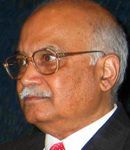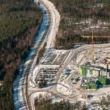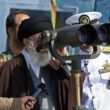Convergence and nuance
By Ramamurti Rajaraman, November 8, 2012
The aim of organizing a Roundtable discussion such as this is primarily to elicit a spectrum of views and arguments on a particular topic. Whether the discussion has an "outcome" — whether it converges into a consensus — is not so important. But in this case, I believe that a convergence has mostly taken place.
As Ta Minh Tuan pointed out in his third essay, all three Roundtable participants acknowledge that, even though the International Atomic Energy Agency (IAEA) has issued assurances that no strings will be attached to gaining fuel supplies from an international fuel bank, many developing countries continue to doubt that they could purchase low-enriched uranium (LEU) from the facilities without their rights' being infringed on. The key point here is not whether nations' fears are justified, or even whether hindrances will actually materialize. Rather, it is the lingering perception that hindrances might materialize. Meanwhile, all Roundtable participants share the hope that at least a few developing nations will benefit from international fuel banks; by and large, I feel that we agree on the essentials in this conversation.
The differences that remain among us are only nuances, and even they can be reconciled. Let me address one of them here. Ta, responding in his third essay to a point I had made earlier, asked whether "emerging nuclear nations can avoid suspicions that they intend to proliferate — even if they maintain good records on nonproliferation." Ta's concern has merit, and I would like to examine it more closely through a hypothetical (and perhaps controversial) example.
Iran has been accused of failing to disclose to the IAEA significant details about its nuclear program. But suppose that Iran had been highly transparent about its nuclear plans from the outset. Suppose it had announced that it would build a bank of centrifuges for enriching uranium, but that it would not produce highly-enriched uranium. Suppose Tehran had in fact kept its enrichment within the bounds of LEU, foresworn any intention of building a weapon, and submitted to all aspects of IAEA supervision.
Would the West have stood aside in that case — especially as Iran's technical capabilities and its stocks of LEU grew to the point that Tehran was technologically poised to produce weapons if it chose to do so? Many Iranians, and many people in the developing world who sympathize with Iran, would probably expect the West to have opposed Tehran's nuclear activities in that situation.
I do not wish to take sides on what Iran's true intentions are. I only advance this scenario as a plausible example of Ta's point that a nation viewed with distrust by major powers may not be able to enjoy its full rights under the Nuclear Non-Proliferation Treaty. Following the rules may not be enough. It may also be necessary to remain "in good standing" with the major developed nations.
Finally, there is one aspect of the arrangements for fuel banks that is not very clear to me. The IAEA says that supplies from a fuel bank could be made available to a country that "is experiencing a supply disruption of LEU to a nuclear power plant and is unable to secure LEU from the commercial market, or through state-to-state arrangements, or by any other such means." But does that imply that a fuel bank is meant to be used only very rarely, perhaps just once? Or can a country access LEU from a fuel bank for as long as the market does not provide it fuel? Assuming that a country experiencing problems with the open market does not have an enrichment facility of its own, where is it to obtain regular fuel supplies, if not from a fuel bank? If regular supplies are not available from a fuel bank, wouldn't a customer nation's nuclear energy security ultimately be at the mercy of bilateral relations with supplier nations?
If a fuel bank only guarantees a first load of fuel for one reactor, I can well understand a country's anxiety about not constructing its own enrichment facilities!
Topics: Nuclear Energy
Share: [addthis tool="addthis_inline_share_toolbox"]














